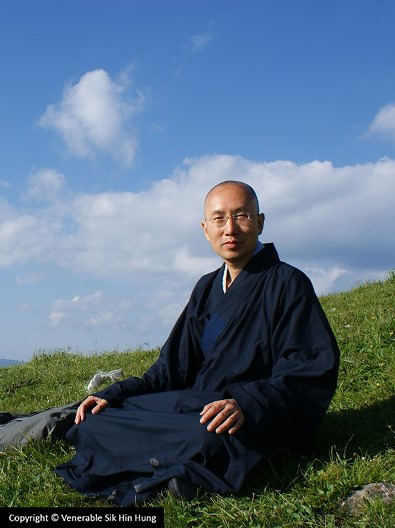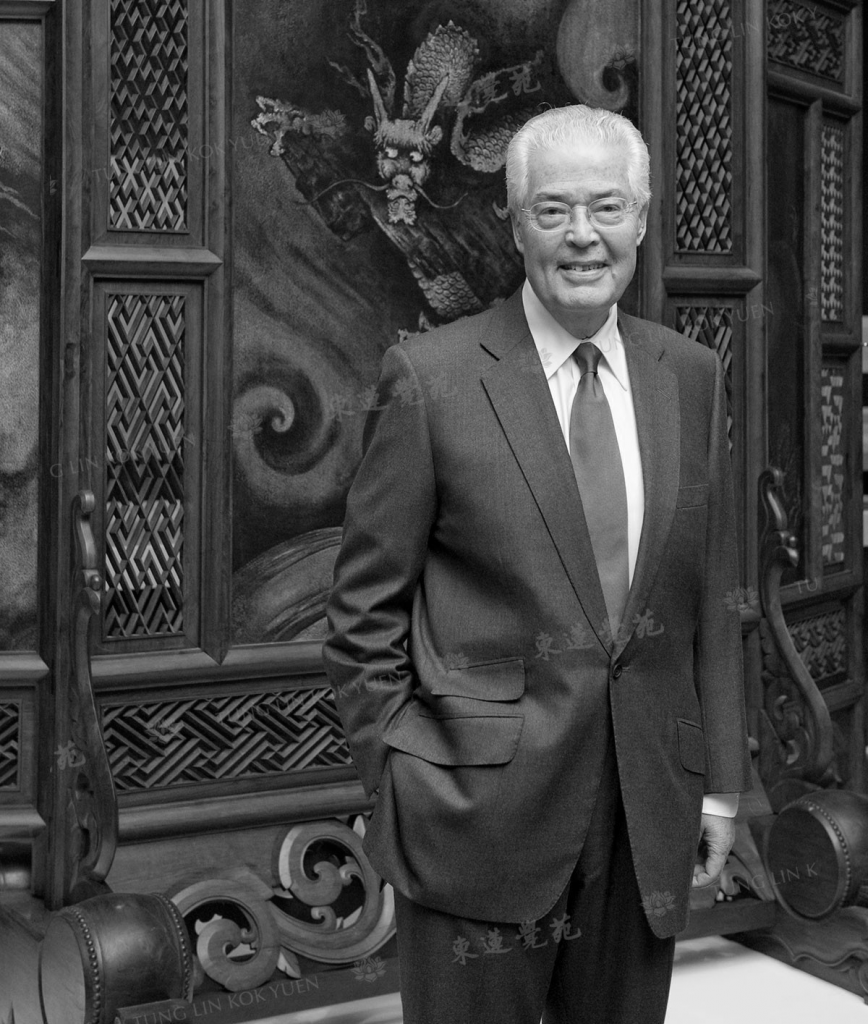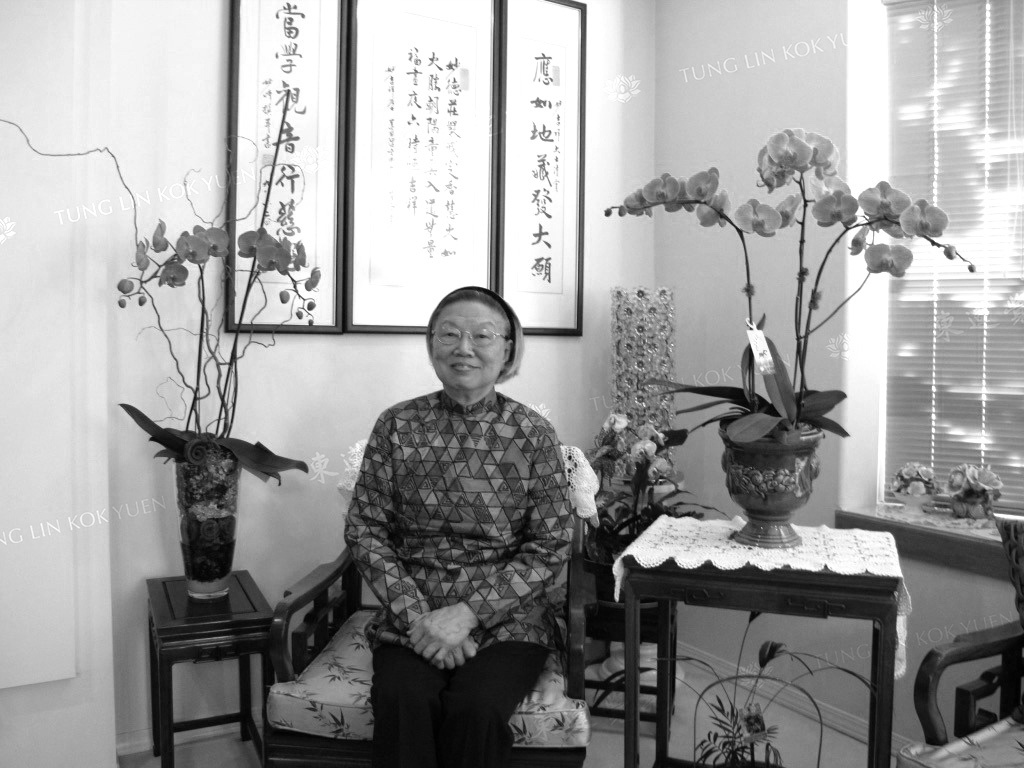Together in the Magnificent Vessel We Carry Ashore
——Buddhist’s Footprints in Hong Kong Education
Episode Two
Venerable Kok Kwong
“In this materialistic society, teenagers may suffer severe mental voidness and became lost. The youth should apply the wisdom of the Buddha: ‘Do no evil, practice all wholesome deeds’, ‘Purify one’s own mind’— the true light for the youth to stand tall in life.”
Venerable Kok Kwong studied Buddhism at Wang Fat Ching She Monastic College in Tsuen Wan, Hong Kong in 1939, but left in 1940 due to the Japanese invasion and the closure of the College. Wang Fat Ching She continued the mission of Buddhist education after WWII, not only through the establishment of the South China Monastic College by Venerable Dan Xu, but also the Hong Kong Buddhist College by Venerable Kok Kwong and Venerable Sai Chun, etc. in 1960s.
Venerable Kok Kwong established the Heung Hoi Ching Kok Lin She Association after WWII. He was also a co-founder of the Hong Kong Buddhist Association and had become the President since 1966. He made exemplary efforts in promoting Buddhism through various charitable services, including schools, youth centers, hospital, homes of aged, nursing homes and cemeteries.
Besides Venerable Kok Kwong’s dedication of Buddhism and philanthropic effort, he had strived to make Buddha’s birthday a statutory holiday in Hong Kong since the 1960s and eventually the goal was achieved in 1999. To celebrate the Buddha’s birthday, Venerable Kok Kwong organized several invitations of Buddha’s relic which were enshrined in Hong Kong for public worship, including the Buddha’s tooth in 1999, the Buddha’s finger in 2004 and parietal-bone in 2012. He was awarded the Gold Bauhinia Star in 2007 and the Grand Bauhinia Medal in 2013 for his contribution to society.
Venerable Sai Chun
“The mission and vision of education and culture is to balance the pursuit of intelligence and ethic, encourage the nurturing of moral characters and practices, let go of egoism for the benefit of the community, and realize the purification of individuals and society.”
Venerable Sai Chun committed himself to Buddhist teachings and practices, dedicating his life into the education of monastics and society, with numerous students and disciples. Since 1950, he founded Miu Fat Ching She and Miu Fat Buddhist Monastery. He introduced the wisdom of Buddhist teachings through dharma lectures, the establishment of nursing houses and, Loi Ming Monastic College, etc. Venerable Sai Chun recognized the significance of education. From the expansion of the Loi Ming Monastic College with the Junior High School level (English) in 1964, the set up of Loi Ming Kindergarten in 1967, the addition of the matriculation courses into the Loi Ming Secondary School’s curriculum in 1968 and the Scholarship of Sai Chun Buddhist Research in the Chinese University of Hong Kong in 1979, all these programs demonstrate his dedication to the development of Buddhist education in Hong Kong.
In 1966, Venerable Sai Chun became the chairman of Hong Kong Buddhist Sangha Association, and initiated the establishment of Hong Kong Buddhist College in the following year. With the support of the Abbot of Tung Lin Kok Yuen, Venerable Man Sang, the first Hong Kong Buddhist College for Higher Education was officially launched at Wang Fat Ching She in 1969, registered as a not-for-profit tertiary institution. The mission of the College is to “Bridge knowledge from the East and West, promote the Chinese culture, and nurture young talents”. The College then moved to Yee Kuk Street, Sham Shui Po in 1970. In 1971, Hong Kong Buddhist College started a summer camp program known as “Short-term monastic retreat” which allowed people to experience the joys of Buddhist monastic living, in the hope of removing the negative stereotype of Buddhist monastics.
Venerable Chi Cheung
“The flourishing of a nation relies on morality and hence Buddhist-inspired education should be promoted. Family is the best unit to commence this. Buddhist ideal of compassion would be put into practice when children are raised in the wisdom of the Buddha.”
Venerable Chi Cheung devoted herself into the education for children in the rural area. She established the Tai Kwong Yuen in Tai Po in 1931 for dharma teaching and practice. In 1945, Venerable Chi Cheung turned Tai Kwong Yuen into Tai Kwong Free School to provide free education for underprivileged children without education opportunities.
To further develop the school and allow more children to have opportunity to be educated, Venerable Chi Cheung registered Tai Kwong Free School as a non-profit organization in 1956 and submitted the application to the government for the expansion of secondary school. Buddhist Tai Kwong Middle School was set up in 1962 and became a fully aided school in 1975. Buddhist Tai Kwong Kindergarten was established in Shek Lei Estate, Kwai Chung in 1971. Unfortunately, it was forced to close due to insufficient enrolment in 1999. Buddhist Tai Kwong Middle School and Buddhist Chi Hong College were combined into Buddhist Tai Kwong Chi Hong College in 2011.
Venerable Chi Cheung volunteered herself as the School Principal for half a century. Her dedication and significant contribution to education was recognized by the award of the Member of the Order of the British Empire in 1978, proudly became the first Buddhist monastic to receive the honor.
Venerable Sik Hin Hung
“Introspection is the key to achieve advancement in life.”
With the great vision of Venerable Sik Hin Hung, and the support of Professor Chack Fan Lee and Professor Cecilia Chan, the Centre of Buddhist Studies (CBS) of The University of Hong Kong was established in 2000 and the first Master of Buddhist Studies program in Hong Kong was launched in 2002. Venerable serves the CBS as a director and currently as its Senior Fellow.
To promote Buddhism and gain more widespread acceptance in modern society, Venerable Sik Hin Hung strives to remove the stereotype of Buddhism with creative modes of presentation. For instance, he collaborated with a local theatre company, Zuni Icosahedron, to produce several multimedia performances which integrated the art of contemporary theatre with traditional Buddhist rituals: “Hua-Yen Sutra” in 2007, 2008, 2013 and 2016, and “Buddhist Chants in Scent and Light” in 2016. Venerable Sik Hin Hung and Abbot Sik Tsang-Chit were the Advisors.
To celebrate the 70th anniversary of the establishment of the Hong Kong Buddhist Association in 2015, Venerable Sik Hin Hung led the production of a musical performance, entitled in “Now I know”, the musical was based on a Buddhist song composed by Master Taixu and Master Hongyi, “The Song of Three Jewels” The musical combined the song with videos, choreography and physical art, to enhance the public interest of Buddhism.
Venerable emphasized the significance of applying Buddhist teachings in counselling. A Master of Buddhist Counseling program has been launched in 2018 to offer quality training on Buddhist-based counselling knowledge and skills by means of interdisciplinary learning and contemplative practice. He founded the Awareness Spiritual Growth Centre and served as the Abbot since 2001. He was also the Director of Tung Lin Kok Yuen and the Spiritual Director of Tsz Shan Monastery Buddhist Spiritual Counselling Centre. He has published books and international journal articles on Buddhism, neuroscience of meditation, Buddhist psychotherapy, Buddhist education and personal growth, e.g. “Orientation to Life Enhancement Project” was designed for high school students.

Mr. Robert H. N. Ho

“My ambition has been to see centres of Buddhist studies in university and, gradually, one by one, to develop a link between them, forming a Buddhist knowledge network.”
Mr. Robert H. N. Ho has succeeded the grand vision of his grandmother, Lady Clara Ho Tung. Since retiring from his management focuses on journalism and family investments, he has concentrated on the mission of Buddhist education and philanthropy. In his previous role as the Chairman and recently as the Honorary Chairman, Mr. Ho has expanded Tung Lin Kok Yuen globally and modernize Chinese Buddhism with financial support, endowment provision and technology adoption, etc.
Aimed at promoting Tung Ling Kok Yuen internationally, Mr. Ho established Tung Lin Kok Yuen, Canada Society in Vancouver in 1994. He also founded Tung Lin Kok Yuen Canada Foundation in 2004 to endow chairs and research programs in Buddhist studies. Through these organizations and Tung Lin Kok Yuen in Hong Kong, Mr. Ho has made donations to the University of British Columbia (UBC), the Centre of Buddhist Studies of the University of Hong Kong, the University of Toronto and the International Buddhist College in Thailand. Advancing Buddhist studies in higher education has been one of The Robert H. N. Ho Family Foundation’s priorities. Through grant-making, the Foundation nurtures Buddhist scholars as well as socially engaged Buddhist professionals at distinguished universities all over the world, e.g. the establishment of The Ho Centre for Buddhist Studies at the Stanford University in 2008 and the donation to Harvard Divinity School for the Buddhist Ministry Initiative in 2011. Mr. Ho also initiated www.buddhistdoor.net, one of the world’s largest and most-visited websites on Buddhism.
Committed to fostering Chinese culture and Buddhist Arts, Mr. Ho initiates and supports overseas programs and exhibitions to promote Buddhism in another angle, including the United Kingdom’s first permanent gallery of Buddhist sculpture at the Victoria and Albert Museum in 2009, the Cave Temples of Dunhuang: Buddhist Art on China’s Silk Road at the Getty Centre in 2016 and Encountering the Buddha: Art and Practice Across Asia at the Arthur M. Sackler Gallery, in 2017 etc., to enhance the public’s interest of Buddhist Arts.
Professor Chack Fan Lee
“Our mission is to share the wisdom of the Buddha with students through high quality Buddhist programs. By applying contemporary languages and methods, we integrate the Buddhist teachings into society, introduce them to the youth, teach people to stay calm and peaceful in this competitive world.”

Madam Susan S. H. Kong

Madam. Susan S. H. Kong
“You have to be acquainted with a broad base of knowledge to understand the wisdom of Buddhism and cultivate virtuous acts into fruition. The most important thing is to apply your knowledge into actions.”
Madam Susan S. H. Kong has significant contribution to integrate Buddhist teachings into the examination syllabuses in Hong Kong.
Madam Kong began her studies in Buddhist sutras since she was 13, and was a Cantonese translator for numerous renowned Chinese Buddhist masters, such as Venerable Hsu Yun, Venerable Tan Xu, Venerable Ding Sai and Venerable Sai Chun, etc. After WWII, pivotal to spreading Buddhist dharma teachings in Hong Kong.
Since Po Kok Free School has transformed from a primary school to Po Kok Girls’ Junior Vocational High School in 1951, and extended the curriculum to senior secondary levels on 1956, Sir Man-kam Lo and Madam Ling Chung Lam reckoned that Buddhist Studies should be one of the elective subjects in the Hong Kong Certificate of Education Examination (HKCEE). Therefore, they invited Madam Kong who assisted in editing “The Selected Buddhist Scriptures” at that time, to develop the content and structure of the syllabus, as well as the Buddhist textbook to support this initiative. Eventually, Buddhist Studies was listed as one of the elective subjects in the HKCEE in 1960.
Madam Kong has lived in Canada since the establishment of Tung Lin Kok Yuen, Canada Society and was invited by Mr. Robert H. N. Ho to serve as a Director and continues to teach Buddhism through lectures, talks and publications.


